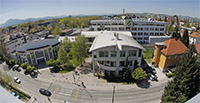 The P2P-Next integrated project will build a next generation Peer-to-Peer (P2P) content delivery platform, to be designed, developed, and applied jointly by a consortium consisting of high-profile academic and industrial players with proven track records in innovation and commercial success.
The P2P-Next integrated project will build a next generation Peer-to-Peer (P2P) content delivery platform, to be designed, developed, and applied jointly by a consortium consisting of high-profile academic and industrial players with proven track records in innovation and commercial success.
The current infrastructure of the Internet is not suited to simultaneous transmission of live events to millions of people (i.e. broadcasting). The problem is that a dedicated stream of data must be sent to every single user. With millions of potential users, the simultaneous streams of data will easily congest the Internet. For several years, we have been told that the answer to this problem is “multicasting”, whereby the data stream is distributed to many local servers that subsequently “re-broadcast” the content to local users.
However, most IP routers of the Internet cannot support multicasting and there seems to be no financial incentive for the ISPs to introduce multicasting. Also, the use of Audiovisual Media is moving from a collective and passive approach to personal active behavior, at home and in mobile situations outside the home. At the same time use patterns are shifting towards non-linear usages, moving away from the classic model of linear broadcast TV. The TV set no longer has the monopoly of delivery of audiovisual content; the PC and related media centers, mobile phones, and potentially initiatives from new stakeholders are all becoming increasingly important.
In such heterogeneous environments, efficient content delivery needs optimized unicast, multicast, broadcast, and also support for new mechanisms that have been made possible by the recent advances in P2P grids. This situation has important consequences for the existing business models and institutions, as well as for content production, content distribution, and end user experience on various terminals. This particular holds for stakeholders that propose services based on heterogeneous terminals and networks, together with the demand from users of transparent service continuity.
This makes Peer-to-Peer -based technologies that can provide efficient and low-cost delivery of professional and user created content essential for the technologically-competitive future Europe.
In response to these challenges, the objective of P2P-Next is to move forward the technical enablers to facilitate new business scenarios for the complete value chain in the content domain from a linear unidirectional push mode to a user centric, time and place independent platform paradigm. A platform approach allows modular development and modular applications, enables knowledge sharing and facilitates technology integration, code- and skill re-use. This translates to fast development of new content delivery applications that build value for service and content providers.
P2P-Next will develop a platform that takes open source development, open standards, and future proof iterative integration as key design principles. These requirements will be developed through collaboration with European and national initiatives, as well as some of the largest and most sophisticated actors in the media and telecommunications sector, ensuring industrial relevance and worldwide application reach. P2P-Next involves 21 partners in 12 different countries, including large European players to ensure the future project’s sustainability, SMEs and Subject Matter Experts to manage highly-focused technology components.
P2P-Next will advance the state-of-the-art in important areas, including evolutionary content distribution, easy access to vast amount of content with metadata federation, social networking, and innovative business models for advertising. The sum of these advances is a large step towards moving the information access from the hands of a producer to the hands of the consumer, and allowing consumers to enjoy and utilise content resources in a mobile and pervasive manner, across the great online space.


